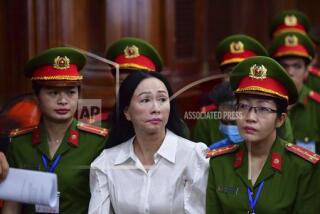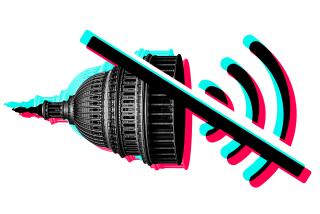Censorship doesn’t keep Vietnam’s rappers from speaking their piece
In a chic second-story coffee shop in Ho Chi Minh City’s financial hub, Hang Lam Trang Anh sips lime juice and reminisces about a major turning point in her life: the first time she heard American rapper Eminem.
“I was like, ‘Damn, this man is so mad!’ But I was so mad, too,” says Anh, wearing a black tunic-dress and a flashy gold bracelet, her hometown “Saigon” — the city’s former name still used by many here — inked in wavy letters on her wrist.
At 25, Anh, who goes by the stage name Suboi, has amassed a reputation as Vietnam’s “Queen of Hip-Hop,” with more than a million fans on Facebook. She performs at clubs and festivals around the world.
Suboi’s rise would be impressive in any country. But considering the Vietnamese society she grew up in — where dissenters’ voices were quashed rather than amplified — her popularity in a medium as foreign and verbal as hip-hop is exceptional.
“In school, they asked us what we feel, and then they said, ‘No, this is not right,’” Suboi says. “It kind of put [our generation] in a box. But now, people are more creative, more open-minded.”
Vietnam’s ruling Communist Party continues to suppress sensitive information and tightly control freedom of assembly. It also cracks down on Internet users who disagree with the government or peddle sexually explicit or violent content.
Democracy watchdog Freedom House in 2014 listed Vietnam’s Internet as “not free,” alongside countries such as Iran and Cuba. The organization said that the Vietnamese government blocked Facebook twice, in 2010 and 2011, and by 2014 Vietnam had jailed more bloggers than any country except China.
“The Communist Party’s supremacy is guaranteed in the constitution, and its legitimacy relies on the socialistic notion that it is the champion of the people,” said Shawn Crispin, senior Southeast Asia’s representative on the Committee to Protect Journalists. “When journalists, filmmakers, songwriters or activists dare to challenge aspects of that narrative, the party tends to view the criticism as an existential threat.”
Despite such pressure, Vietnam’s burgeoning rap scene has found a home on the Internet, as well as in the clubs in Hanoi and Ho Chi Minh City.
Suboi says she views censorship as an artistic challenge. She often changes her lyrics depending on what language she is rapping in, using double meanings.
If she’s writing about sex in Vietnamese, for instance, she’ll layer her lyrics with references to Vietnamese egg fruit, or leukoma, instead of directly mentioning female reproductive organs. For example, her lyrics: “A girl, with two leukoma gardens / The process happened, a baby came, the whole family filled with joy ...”
“I write everything [so people] can read between the lines,” she says. “Let’s just say I keep it poetic.”
Other rappers, such as Son Nguyen, say state suppression has compelled them to openly lash out against the country’s government.
The Oklahoma State University student has dedicated much of his music to lambasting the Vietnamese government and challenging its values. Nguyen, who goes by the stage name Nah, is a Ho Chi Minh City native whose song “DMCS,” an explicit critique of the Communist government, has more than 800,000 views on YouTube.
The charged lyrics include: “The socialist regime’s docile sheep don’t dare to even listen to it.... While the Communist Party is selling our father’s land / The whole generation has been brainwashed / What a misfortune!”
Nguyen, 24, says the safe haven of America has allowed him to dig deeper into his country’s history and politics. Still, he remains wary. His parents and younger brother remain in Vietnam, and he worries that his outspokenness might put them — or himself, if he ultimately returns — at risk of government retaliation.
In 2013, the Laborer, a state publication, verbally attacked him and other Vietnamese rappers after a performance in Hanoi. The story questioned whether the “disastrous” art form could even be considered music, and aired fear that such “deviance” would surely have a negative influence on the country’s youths.
Another named in the piece, Nguyen Ngoc Minh Huy, 26, who performs under the name Wowy, has decided the best way to deal with political issues is to brush them off and not mention them in his lyrics.
Heavily tattooed and dressed like a Buddhist scholar mixed with urban hipster, he says he used to rap about Lamborghinis, jewelry and other gangster rap cliches. But now, whether he’s waxing spiritual about the Buddha or writing lyrics about the personalities of the five elements, he considers censorship a nonissue.
“I thought about censorship, because everybody kept asking me, ‘Are you worried about censorship?’ Yeah I’m worried, because they’re worried, so I’m worried!” he said, staring out at the city from the historic Giac Lam Pagoda. “But now I don’t worry because I still go to shows, my music is still coming out, everybody still listens. Why do I need to worry about censorship?
“Some are surprised that we have rappers in Vietnam,” he said. “Everyone outside thinks Vietnam is a poor country, and that we still have a war. But the fact is everybody here has an iPhone 6 and a 6 Plus already!”
Harfenist is a special correspondent.
More to Read
Start your day right
Sign up for Essential California for news, features and recommendations from the L.A. Times and beyond in your inbox six days a week.
You may occasionally receive promotional content from the Los Angeles Times.






